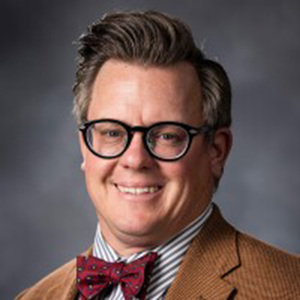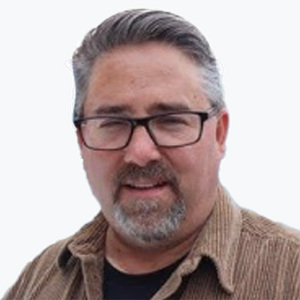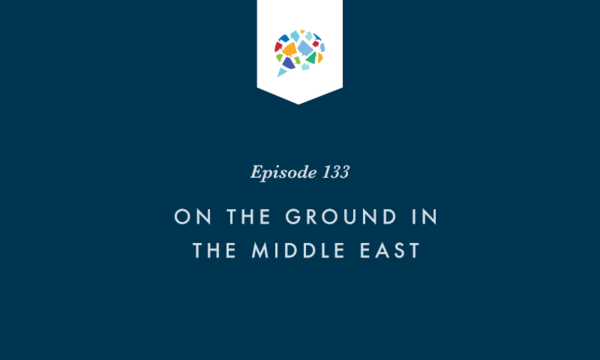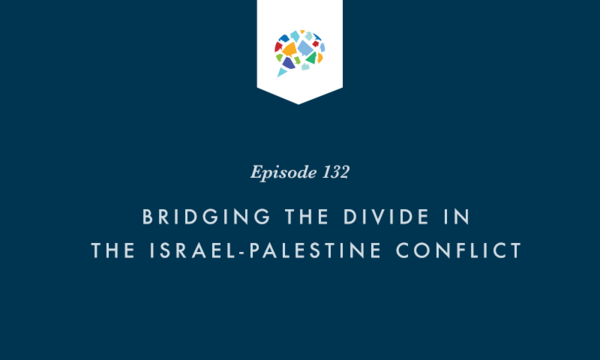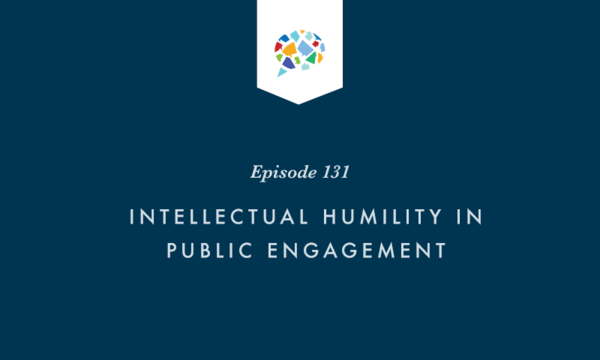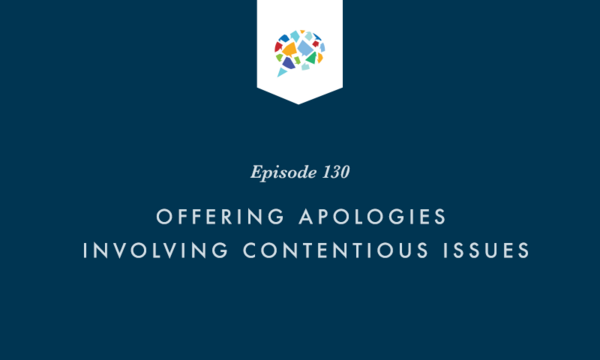
Under»ĆąĎĘÓƵ students have a thirst for interfaith conversations. So this past spring professors and students from Brigham Young University traveled to Southern California to engage in meaningful conversations and build relationships with professors and students from Biola University. On today’s episode, Tim speaks with Andy Reid, associate professor of religious understanding and church history at BYU, and Greg Johnson, the founder of Standing Together ministries, a bridge-building ministry focused on LDS/Evangelical dialogues. They reflect on this experience at Biola and consider features of spending time together that provided opportunities for learning and ways to seek God in the faith of others, even while drawing attention to clear differences.
Transcript
Tim Muehlhoff: Welcome to the Winsome Conviction Podcast. My name is Tim Muehlhoff. I'm a professor of communication at Biola University in La Mirada, California, and the co-director of the Winsome Conviction Project that seeks to open conversations, rather than close them, with empathy, perspective-taking, listening, intellectual humility.
One of the fun things about this podcast is a segment you've gotten used to called People Doing It Right. So all of us bemoan the argument culture, and rightfully so, but we just need to be encouraged every once in a while that there are small little pockets all across the United States where people are meeting in backyards and parks, and they're actually having really, really good conversations.
Today is not the small pockets we're going to focus on, but what happens when two faith-based institutions decide we're going to have conversations? I think there's great hope that that can move the needle as well as open up for criticism. So what's happening right now is that Brigham Young University has sent a group of students along with three faculty to come to Biola University. They're actually doing a West Coast tour.
They're going to be at Azusa. Then they're coming to Biola University, and then they're going to Westmont. So as we speak, students have been going to AfterDark Chapel. We've been having meals together. They attended a class that I did on rhetoric. It has exceeded expectations from at least my perspective, from Biola's perspective.
I've invited two brand-new friends to join, and I'm going to have them introduce themselves, but I'm going to start with Andy. Andy, can you just introduce yourself, your role with Brigham Young University?
Andrew Reid: Great. Yeah, absolutely. Thank you, Tim. I am Andy Reid. I am an associate professor of church history at BYU. I teach courses in interfaith engagement, world religions. I also teach a course in the honors program that is about religion and poverty, which has been a transformative class for myself and for students.
Currently, I'm the Richard L. Evans Chair of Religious Understanding at BYU, which has a specific charge to work with religious, political, and thought leaders throughout the world.
Tim Muehlhoff: What brought us together initially is we both have a great disdain for Duke University basketball. I kind of feel-
Andrew Reid: Absolutely.
Tim Muehlhoff: ... Spirit-led on that one. Greg, welcome. You are not at BYU, but you are kind of the reason this all came together. Just give us a little bit of who you are in the group that you represent.
Greg Johnson: Yeah. I live in Utah. I'm an evangelical pastor, and I lead a ministry called Standing Together. Standing Together formed 24 years ago after nine years of being in the pastorate in Utah.
I was not born into, but my mom converted to the LDS faith when I was four, and I was in the LDS church for about 11 years and had a born-again Christian experience at a Christian camp in Colorado Springs, but from that time forward, had a real burden to see the relationship between Latter-day Saints, the people that I came from, and the evangelical community, the people that I was now identifying with, move from a place of hostility and anger and contempt and confrontation increasingly over my high school, college, seminary, and eventually my time in Utah as a pastor, to see this relationship and this paradigm shift from a place of hostility to a place of relationship.
God ordained that I should have some wonderful opportunities to connect with some BYU professors, Bob Millet at one point, and an LDS General Authority leader, a man by the name of Elder Jeffrey Holland. From that time forward, in about 1997, one thing after another has opened up. So we are really big in facilitating and trying to bring flourishing to dialogue between university students, scholars, and leaders.
So that's a big part of what Standing Together does and what I'm very passionate about doing.
Tim Muehlhoff: Well, that's great. Well, thank you all for all the prep work to make this a reality. Andy, let me ask you this. We've just met.
Andrew Reid: Absolutely.
Tim Muehlhoff: I mean, you guys are on a whirlwind tour. It's less than 24 hours that you're at Biola University.
Andrew Reid: Right.
Tim Muehlhoff: I assumed it was BYU spring break. I absolutely assumed that because there's what, 14 students?
Andrew Reid: 14 students.
Tim Muehlhoff: Okay. I assumed they're giving up their spring break, which I thought was amazing. Then we come to find out, no, no, no. BYU doesn't have a spring break. They're literally going to be taking finals in what, two weeks?
Andrew Reid: About two-and-a-half weeks. Yeah.
Tim Muehlhoff: So they're here. Hey, I tip my cap as a professor. That's amazing. So tell me from your perspective, why in the world would BYU students do that? And second, why, as a faculty member, would you take time out and travel with them?
We're not kids anymore. We were dying last night. We had a great chapel time, but we were just dying. So why would they come, and why would you want to be a part of it?
Andrew Reid: Yeah, absolutely. I just learned about this trip two weeks ago. It's developing very quickly. About February-
Greg Johnson: Can you say fast track?
Tim Muehlhoff: Fast track. Yeah.
Andrew Reid: That's putting it mildly. But I think it was in February, late January, BYU's president, President Shane Reese, and our commissioner of church education, Elder Clark Gilbert, came down here to Biola and visited with your own president and had a wonderful conversation. Just a couple weeks ago, we were invited to think about could we pull something like this off on very short notice.
To me, I think our students, there's a thirst for this kind of engagement. It's so easy in the world for our students to find places where the conversations are not happening, where conversations are shut down, doors are closing. For our students, they're finding their way to these conversations through whatever means are available.
If you ask BYU students who are here on this trip, there's a lot of reasons they're here. But I think first and foremost, it's they thirst for these kinds of conversations where they're visiting with people who have convictions, people who have beliefs, people who want to have a solid standing point in the world as people of faith, and Biola's producing those kinds of students.
I think for our students here, they're here because they want to engage the world on big topics. They are ambitious. So it's amazing to me.
Tim Muehlhoff: And they jumped in. I mean, we had dinner. We had a room that was reserved. They just sat down, and they were just off to the races. It was really cool to see. One, they identify as college students super quickly, but then they really do want to engage.
Okay. So that's them. Why would you take time out and live a tired existence to do this?
Andrew Reid: One of the things that I have the privilege of doing at BYU is helping facilitate and create these kinds of programs for students. I have just come to understand how transformative this can be for our students. For me, I mean, it's a challenge. We're close to the end of a semester, so we're giving up class time with our students who are wanting to prepare for finals and all those things.
But I just am so convinced that these kinds of opportunities can't be replicated sitting at BYU in a classroom. BYU is a unique place. It has a very small group of students who are not Latter-day Saint students, and so for us to have students who can engage in this way in a kind of intensive ... I mean, we're doing this at three schools this week, and we are just moving and moving and moving.
But there's a kind of energy to our students. I love watching it, and it gives me inspiration. It adds to my own energy to be able to do more of this. New dialogue partners are always sought after, and it's just a great place to do this.
Tim Muehlhoff: Educator to educator, I love what you just said about there's just only so much you can do in a classroom. Listeners know my faith story of becoming a Christian through karate, so martial arts is very important to me. Bruce Lee had a great quote criticizing how martial arts is taught. He said, "Many places, they teach swimming on dry land."
Greg Johnson: What a great quote.
Tim Muehlhoff: We can learn a little bit on dry land, right? But you got to get in and feel the currents and swim, and I love opportunities like this that we take it outside the classroom. You meet people. Our students were a little bit nervous, a little bit apprehensive. But just to see them click and the jokes that have just arisen so quickly, I think has really been cool. I love that it's transformative for you as well. I feel that, too. I feel like I'm learning as much.
So, Greg, the vision to do this, how did that percolate? When did you first start to get the idea that I think we can start to cross bridges between these two different faith groups?
Greg Johnson: In my personal spiritual transformation, I didn't have a context for that at all. We left Colorado and moved back to Southern California. I found my way to a local Christian high school here in the Whittier area, Whittier Christian High School.
Tim Muehlhoff: Yeah. Whittier Christian. Oh, we love Whittier Christian. Yeah.
Greg Johnson: Went up to Westmont College and-
Tim Muehlhoff: We don't like Westmont. Excuse me. This is the Biola Winsome Conviction Project Podcast.
Greg Johnson: We can't mention the opposition. I'm sorry.
Tim Muehlhoff: No, we do. We love Westmont.
Greg Johnson: Yes, I know. But in that era, in the mid and late '80s, was almost the fever-pitch period of anti-Mormonism, the Walter Martin style of engagement over the radio, The Bible Answer Man Program. I was a part of that style of ministry. Then I went off to college, and I met Dr. Ron Enroth, who is a sociologist of religion, and I began to feel his influence in my life.
And then I went off to Denver Seminary, and then there was Gordon Lewis at Denver Seminary who began to influence me as well to say, "When we disagree with people, it doesn't give us a right to be disagreeable. We need to start thinking missionally, not just apologetically, building relationships, gaining the right to be heard, serving the people that we want to communicate with."
So that when I came to Utah as a young pastor in 1992, I served with a former missionary for the conservative Baptist church that I was a part of, and he talked a lot about building relationships in foreign countries as opposed to just preaching and teaching and being dogmatic. So in those formative high school, college, and seminary and early days of pastoring, it just became very clear that the people that I love the most oftentimes seem to not think well of me because I was engaging in a confrontational style.
In the process of doing that, I felt like this cannot be the way God wants it to be, and we don't. We say this to our students all the time. I've been facilitating the evangelical/Latter-day Saint student dialogues in Utah from evangelical schools out here in California for about 22 years.
Tim Muehlhoff: Wow.
Greg Johnson: We started in 2003 at BYU with a group from Colorado Christian University, and we've been doing it ever since. But in that vein, we couldn't come to BYU as people that were there to attack and to seek to confront the worldview of the LDS Church. We had to come on and build relationships, and authentic relationships, not relationships in order to get to the real point of the mission.
So I think that became more and more transformative, and I began to see the fruit of these relationships. The biggest concern, I know you face this in the Winsome Conviction arena as well, that people will think that if you're nice to people that you disagree with, you must be selling out. You must be compromising. That's the only way that happens, and it's just not true.
Jesus tells us to love our neighbor, and He tells us to love our enemy. My friend, Bob Millet, and I used to do a public presentation where we'd say, "Whether you think the Latter-day Saint is your enemy or just your neighbor, you got to love them the same. And if you think that the evangelical is your neighbor or your enemy, you got to love them the same." Authentic love is palpable. It's discernible.
If people are loving you for a particular reason, to get to a certain agenda, it doesn't feel very loving. But if they love you authentically, and what Bob and I ended up discovering is that we could have the greatest relationship, talk about all of our differences better as friends than as adversaries, and that we could also, and I think this is the genius of dialogue, we could defer to a greater agenda from God Himself and say, "Hey, I might want to influence my friend, Andy, here. I think Andy probably wants to influence me a little bit."
We can do that authentically and carefully and kindly, but at the end of the day, we leave the results with God. We say, "God, if Andy needs to do some moving, you help him move." And then he can say as well, "If Greg needs to do some spiritual moving, you help him move." Because Paul says in 1 Corinthians that, "We plant and we water, but God gives the increase."
So that has really been the genesis and the working out of a more dialogical, non-debate format of evangelical/Latter-day Saint conversation, and it's been well-received.
Tim Muehlhoff: Yeah. I think one of the big problems of the argument culture, from my perspective, is we have confused acknowledgement, perspective-taking with condoning. I've been asked to respond to a book that has come out called The Sin of Empathy. I think we're going off the rails, and we're confusing seeking to understand, which is the Book of Proverbs, with somehow that means that you're condoning, or opening up a dialogue means that kind of thing.
But let me go back, Andy, just for a second, and talk about this meeting that you referenced with the president and Elder Clark here on campus. In the morning, and this is such a tribute to BYU, it was all about religious freedom. We live in California, which is not overly thrilled with the Bible Institute of Los Angeles, and they have periodically made that known.
We went through a really rough patch a while ago, and BYU reached out to Biola and said, "Listen, your religious freedom is our religious freedom." Honestly, you guys have much more resources than we do, and you graciously offered those resources to say, "Hey, we're in this together." The whole morning was based on how can we strengthen those bonds when it comes to religious freedom?
The afternoon, I gave a presentation on dialogue. I don't often get nervous. I was nervous. I mean, I'm looking at the president of BYU and Elder Clark, and I'm thinking, okay. So I tried a little bit of humor. Barry had mentioned that I'm from Detroit. He had mentioned that in the introduction and that I was a little bit bitter because we had not made the Super Bowl.
So I said to everybody, I said, "98% of Americans agree on one thing. The Lions should have been in the Super Bowl." They howled laughing. I thought, okay, these are regular people, and I think we're going to be okay. But right afterwards, your president and Elder Clark walked right up, gave me a hug, and said, "Listen, let's do it."
Now, I didn't know let's do it meant let's do it in a month. That took us by surprise as well, and our heads were spinning a little bit. But it also encourages me that when constituencies put their minds to it and put their resources to it, we can actually see some pretty big steps happen very quickly.
Andy, you attended a chapel service, we call it AfterDark. This is clearly for young students. It starts at 9:15, goes on forever. By extended worship, we laughed, but they would stay worshiping forever. You're always excited when you're invited to speak at AfterDark, and you're always like, "Doggone it. I got to say yes." So you attended that.
What was your takeaway? And then even a little bit of a synopsis that President Corey spoke on this idea he has of a firm center, but soft edges, I'm curious how you interpreted what he had to say.
Andrew Reid: Well, for Latter-day Saints, what happened at AfterDark is so foreign to us. Our worship just looks radically different.
Tim Muehlhoff: Oh, I didn't know that.
Andrew Reid: Yeah. Fundamentally different in many ways.
Tim Muehlhoff: Can I ask how so?
Andrew Reid: Yeah. Well, for Latter-day Saints, and we'll just talk BYU context for a minute here, we do have a weekly what might look like a chapel session, but we call it devotional. It's in our basketball stadium, which seats, I think, 18 to, I don't know, 20,000 people maybe. It's huge.
Tim Muehlhoff: Except for everything, that's just like ours.
Andrew Reid: Yeah. But it starts off with a Latter-day Saint hymn, and it has an organ that plays the music usually and a prayer and then a speaker. There isn't that participatory element that we saw students last night participating in, singing with the band.
Tim Muehlhoff: And your students-
Andrew Reid: Oh, they love it.
Tim Muehlhoff: I was peeking out of the ... It sure seemed like they jumped right in.
Andrew Reid: That's the thing is this is a foreign concept in some ways to them, but they also recognize it as worship, which was a beautiful ... because I was doing the same thing. I was watching to see how ... I wanted to understand how the Biola students interacted with this because this is mandatory. Chapel's mandatory in some way for them, right?
Tim Muehlhoff: Yes. It's mandatory.
Andrew Reid: Our students were watching this. I mean, it was late. We've been moving for three days now and talking to our students as we left there, and we had a chance to visit with President Corey last night for a few minutes. They didn't want to stop. They want to keep going. If we didn't have something else going, they would've stayed in worship. I think they would have stayed for I don't know how long, but-
Tim Muehlhoff: We would have been asleep in the back. We would have been.
Andrew Reid: So it looks different here, and our students love that. It introduces them to new ways of thinking and doing. A really wonderful person, Barbara Brown Taylor, wrote a book called Holy Envy: Seeking God in the Faith of Others.
Tim Muehlhoff: Oh, wow.
Andrew Reid: I mean, she embodies what that means, that I can sit with someone else. I can observe their walk of faith, their religious life, and I can learn something from them, and not just learn something, but recognize what is so powerful for them and desire it, wish I had it in my own life. So for me, I just think that what our students had a chance to experience last night with Biola students was powerful.
As they come out of that, they were alive. I mean, they really were.
Tim Muehlhoff: They really were.
Andrew Reid: And just in so much conversation and just really wanting to understand why that was so powerful.
Tim Muehlhoff: I felt it, too. I love worship music. There's just something about it. It's even hard to articulate. That's all student-led. That's what's kind of cool is to look up there and these are all students that are in your classes, and they form worship teams. I really felt the presence of the Spirit and some pretty powerful things.
Andrew Reid: Absolutely. Absolutely. I think that would be confirmed across all the BYU students. The one thing that I thought was so powerful, and we see this at BYU, too, to have a university president, because he spoke last night in chapel session, to hear him, from a position of conviction and faith, articulate for students here why Biola matters.
That is something that we are leaning into so much right now at BYU, to have not just can the students find faith while they're here, can they have experiences that are meaningful, but to have our university administration, to have our professors and faculty ...
You spoke in class earlier today about just what it means to be hired at a university like this and the process that we go through, to have everybody leaning into a mission that the university holds for their students in explicit and overt ways, I think, is important for our students to recognize that. That's what I think our students are seeing here at Biola.
They're recognizing a sister institution that says, "Oh, this looks like something I know, but it's so different." And yet it feels like home in some ways. So it's beautiful.
Tim Muehlhoff: I say to my students, "All my education was from secular universities, and I loved it." UNC Chapel Hill, I so admire the professors, even if we have deep disagreements. This is my 21st year at Biola. I still feel like a kid in a candy store. Are you kidding me that we get to do this in class? We close down the entire campus in the fall and do a three-day Bible conference and then a three-day missions conference in the spring.
I say to my students, who can grumble like, "Do I have to go?" It's like, "Guys, you get to go. Are you kidding me? We can go grab Christian students on secular campuses. They would flock and sleep overnight to get good seats. So let's not take that for granted that we're faith-based institutions."
What was your take, Greg? Was that your first chapel at Biola University?
Greg Johnson: It may have been at Biola, but it was a common experience to a lot of contemporary worship gatherings, whether it be Sunday morning at a local church or other Christian colleges. Iran, if I'm saying that name correctly, a student from BYU came out of there, and he was kind of just pouring out his thoughts. He goes, "Man, that president, he's so interesting, and he's so transparent." He was just marveling over the message itself and the communication.
Another faculty from BYU talked about, "We need this. We need this kind of worship among our youth." Because what I find is that human beings, by nature, tend to cluster with people that look and act like them or think like them, and so what becomes your tradition becomes what is right.
In an LDS context, going to a sacrament meeting on a Sunday morning where you would hear hymn music and an organ and very quiet and slow-paced singing, and then you come to a contemporary Christian evangelical church where there's a band and contemporary music and lights and smoke machines and all the above, it just kind of blows the mind like, "This cannot be right because this is so different, and it's got a band up there."
I'm actually in a conversation with one of the retired General Authorities right now about music and worship, and we're having a phenomenal conversation. I shared with him a Casting Crowns song-
Tim Muehlhoff: Oh, my goodness. Yeah.
Greg Johnson: ... as a link to YouTube. His first reaction was, "Really enjoyed the lyrics. Didn't care for the music." I totally backed off on that. And then he came back and he said, "I wondered a little bit about my response. So I went and listened to more of these guys on YouTube, the Casting Crowns band, and I found that I really started to like them." I think that just speaks to that what is normal is right.
But as inquisitive human beings and as learning human beings, we should be able to say, "Maybe I can step into arenas that do feel different, step back, think about it, look at it, evaluate it with a more open perspective." I think that's what, again, good dialogue leads to in conversation, but also in experience.
So one of the major things we've seen in our student dialogue, and it happened at APU a couple nights ago, the LDS and evangelical groups kind of formed off into little groups and took a scavenger hunt around the campus, and one of them was to the prayer chapel. So when they came back, they reported. A young LDS student named Brandon initiated, "Hey, we're in the prayer chapel. We should have a prayer together."
It was he, not the evangelical student, that initiated that idea. They prayed as a circle. The report back was how meaningful that was. We all acknowledge it was one of the most amazing takeaways from the experience. So I think experiencing worship together, talking ... People say, "Well, you can't worship together because they're worshiping this way." No, we can share that experience and let it have its own effect.
That's the concept. Frank said that last night as we were walking out. He goes, "Man, I have holy envy for this kind of worship. This is not bad. This is good, but it's just so different." We have to give him a little time to adjust and to be more comfortable with it. But I thought it was awesome. We're looking forward to where we're heading later to Westmont.
All three of these Christian colleges are offering their own expression of welcome and invitation and conversation, and so far, they're different but there's a common thread of that charity. Iran said to me, he goes, "They are so hospitable here at Biola."
Tim Muehlhoff: Oh, come on. Come on.
Greg Johnson: That's what he said. He's from South Korea, so the idea of honor and hospitality. "I have never been treated so nice as I have been here at Biola."
Andrew Reid: Well, can I just add one thing to that, Greg, because I think there's such a powerful idea that we sometimes don't know how to think about, which is the thing that's normal is right. I think there's some value in honoring that position, to say the thing that is in my tradition ... We are all part of a tradition because we choose to be a part of a tradition and because it feels right.
That comes with all kinds of things, ideas about the world, the way I see other human beings. That gets reflected in our worship, and it gets reflected in the way that we engage with our community. For example, in chapel last night, I don't think our students were saying, "Mine's wrong because this seems really interesting," but they were saying, "I don't have this, but it's powerful."
So I think that question of what is right and what is wrong isn't even always part of the conversation that comes out of this dialogue is Greg thinks about the world differently than I do, and we've done this long enough together. We know where some of those points are. But at the same time, it's a constant opening up of self to each other that I'm learning things about Greg as we're driving down here I didn't know about Greg, and we've been doing this for what, 11, 12 years together, at least in various ways.
So there is a constant opening up of the self to each other as we sit in worship, as we sit and talk, as, I mean, we had nine hours in the vehicle driving down here together to sort through some ... No, but a lot of fun, right?
Greg Johnson: Yeah. Yeah.
Andrew Reid: But it's that opening ourselves up. It's a kind of disposition I think that is required for these conversations.
Tim Muehlhoff: It's the disposition, I think, we're losing today. One, I don't think it's valued anymore. I don't think that disposition perspective is even trumpeted in certain circles today, and I think we need to readdress that.
We don't often do two-part series, but by golly, we're doing a two-part series. I want to explore this friendship because I like, Andy, what you said about you are not oblivious to the differences, but you've had an 11-year friendship. I would love to explore that of how does that get navigated? And obviously, by extension, how do we have those kind of dialogues between two great faith traditions?
You've been listening to the Winsome Conviction Podcast. If you're interested, go to winsomeconviction.com. We have a quarterly newsletter. Please sign up for that. Give us a like wherever you get your podcasts from. We don't take you for granted.
If you get a chance, please check out part two, where we talk about both the similarities, the things that we can link arms with. But we want to be honest, there are some very real differences between the two communities. And yet, how do you keep a friendship going in spite of those differences, be it religion, politics, or UNC Duke? Thank you for listening.
Greg Johnson: Okay.
 Biola University
Biola University
